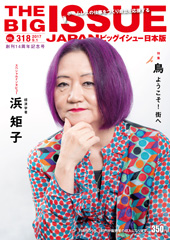
一年前と まったくおんなじようなことが続いていますねえ。 地位協定はきっちりとみなおしたんでしょうか。
さてさて 今日は八丁堀で「雨が降るんかねえ」と声を交わしながら ビッグイシューを買いました。
ビッグイシューは1991年にロンドンで生まれ、日本では2003年9月に創刊しました。ホームレスの人の救済(チャリティ)ではなく、仕事を提供し自立を応援する事業です。
例えば大阪では野宿生活者の約7割が働いており、過半数の人は仕事をして自立したいと思っています。『ビッグイシュー日本版』は働き収入を得る機会を提供します。
詳しくは販売のしくみをご覧ください。
1.民間の力を強める社会的企業
社会的企業とは、ビジネスの戦略と手法で社会問題の解決にチャレンジする企業のことです。ビッグイシューは事業性に賭けて、NPOではなく“有限会社”を選びました。大きく事業をすることは、ホームレスの仕事をたくさんつくることだからです。また、販売者は私たちの代理店、ビジネスパートナーであり、自営業者なのです。企業の社会的責任活動(CSR)を展開する多くの日本の企業と連携して、ホームレス問題の解決を手はじめに社会再生キャンペーンを行い、民間の力による社会改革と社会運営を進めたいと考えています。
2.路上の雑誌販売、四重苦に挑戦
ビッグイシュー日本は100%失敗するといわれました。日本では、1.若者の活字離れ、2.雑誌の路上販売文化がない、3.優れた無料誌が多く有料では買ってもらえない、4.ホームレスからは買わない、という四重苦があるからです。創刊から4年余、多くの市民とともに、この常識に挑戦してきました。
3.さわやかな街角コミュニティ
ビッグイシュー販売者には、制服、マニュアルはありません。Act Naturally。マニュアルではない心を込めた「ありがとう」がさわやかな街角コミュニティをつくっている、といわれています。また、販売者の姿に励まされる、という声もよく寄せられます。
4.ホームレス、自立への3つのステップ
自立は人それぞれ、人の数だけかたちがあります。私たちは、自立とは自らの力で生活を立てているという“自覚”と“誇り”ではないかと考えています。自立へ、私たちは次の3つのステップを考えています。
第1ステップ 簡易宿泊所(1泊千円前後)などに泊まり路上生活から脱出
(1日20~25冊売れば可能に)
第2ステップ 自力でアパートを借り、住所を持つ
(1日30~35冊売り、毎日1,000円程度を貯金、7~8ヶ月で敷金をつくる)
第3ステップ 住所をベースに新たな就職活動をする
今、販売者の多くは第2ステップに挑戦中です。
5.特定非営利活動法人ビッグイシュー基金
自立の第2、第3ステップを支援するため特定非営利活動法人ビッグイシュー基金で、市民が市民をサポートする“再チャレンジ”応援事業を行います。
社会とのつながりを回復できる生活自立や就業トレーニング、生きる喜びを感じられるスポーツ・文化活動、ホームレス問題の解決や予防について市民とともに協力する市民参加の3つの応援事業を行います。(詳細はビッグイシュー基金サイトにて)
6.失敗しても再チャレンジしやすい社会へ
ホームレスと若者に共通性? それは、ともに仕事がないこと。大卒者の就職率は60.8%(2010年)、しかも3年後に34%が離職、非正規雇用者は男性20.1%、女性54.6%と男女とも2011年には過去最高を更新しています。
若者にとっての仕事は、スキルとキャリアを積むことで具体的に社会へ参加できる機会でもあります。チャンスを与えないで使い捨て、社会参加の機会をつくれない社会に未来はあるのでしょうか。NPOビッグイシュー基金とともに、何度でも再チャレンジができる社会の創造に貢献したいと思います。
|
Children in Gaza describe living under Israeli siege and attacks as worse than being in prison.
Nour Samaha Last Modified: 23 Nov 2012 21:17
|
|||

UN Committee on the Rights of the Child said that recent fighting will result in "deep trauma" for Gaza's youth [Reuters]
|
|||
|
BEIT LAHIYA, GAZA - The only protection the Awajaa family has against the Israeli rockets is a thin tarpaulin, stretched out over a small plot of land.
“I don’t want to die, and I don’t want anyone else to die, and there is a strong possibility we can be killed.” “If there was a stronger word than prison, then this is where we are. In a prison you can move around, here you cannot,” she said. “If you are in a prison, you do not get bombed. Here we are in a prison and we get bombed.” Awajaa, Omsiyat’s mother, described how her children would clamber on top of her as the missiles fell around them, too afraid to sleep. Four-year-old Zakriyat would cry all the time, insisting her parents lie next to her. Ten-year-old Hala spent most of the time under a blanket. Three-year-old Layali would be too afraid to move from the bed to the kitchen for food. Six-year-old Diaa, who suffers from hearing and speech problems as a result of the 2008-09 war, has started wetting the bed.
“The culture here is very advanced in the concepts of liberation, self-determination, and right to exist ... therefore, the more parents are aware of this, and transmitting this to their children, the more the children understand and can remain calm.” Follow Nour Samaha on Twitter: @Nour_Samaha |
今年はカープがさえなかった分 サンフレッチェががんばってくれましたネ。
でも、町中は静かですねえ。
今日は朝から 社会福祉士会の 食事と相談会でカレーつくりの手伝い、ほかのスタッフよりも早く食事をごちそうになったあと、自助グループのミーティングに参加、少しはまた ゆとりをいただいて帰りました。 降られるかなと思っていた雨も上がって万歳。
広島がJ1初優勝 2位仙台敗れ、最終節待たず決定
創設から20年の節目を迎えたサッカーのJリーグ1部(J1)は24日、リーグ発足の1993年から参加しているサンフレッチェ広島が初優勝を果たした。本拠の広島ビッグアーチで、セレッソ大阪を4―1で破った。2位の仙台が新潟に0―1で敗れたため、12月1日の最終節を残して勝ち点を4差とし、逆転される可能性がなくなった。西日本のクラブが年間王者となるのは、2005年のガンバ大阪以来、2チーム目。
広島は94年に第1ステージで優勝したが、年間王者は初。Jリーグ創設時の10クラブでは唯一、J1、ナビスコ杯、天皇杯の「3大タイトル」と無縁だったが、初めて頂点に立った。OBの森保一監督(44)は、就任1年目での快挙。
現行の1ステージ制になった2005年以降、最終節を待たずに優勝を決めたのは、10年の名古屋以来2チーム目。9月15日に3度目の首位に立って以降、一度もその座を譲らなかった。














